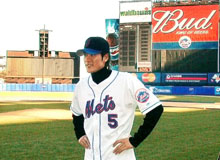BASEBALL MOVES:
Shinjo Follows Ichiro to the Major Leagues
January 22, 2001
|
 |
|
Tsuyoshi Shinjo in his new Mets uniform. (PANA)
|
Two of Japan's biggest baseball stars decided at the end of 2000 to test their skills in the U.S. major leagues next season. They are Ichiro Suzuki, who has been top batter in the Pacific League for seven consecutive seasons, and Tsuyoshi Shinjo, who was the number-four batter for the Hanshin Tigers, the popular Kansai-based team. Several Japanese pitchers have moved to the major leagues in recent years, led by Hideo Nomo, but this is the first time position players have crossed the Pacific. Both Suzuki--or Ichiro, as he is known--and Shinjo are outfielders. Ichiro has joined the Seattle Mariners, and Shinjo has signed for the New York Mets. Next season, which begins in April 2001, Japanese fans will have one eye on the major leagues to see how these players perform.
Posting System Takes Ichiro to Seattle
Ichiro's transfer to the Seattle Mariners was decided with much fanfare through the use, for the first time ever in Japan, of the posting system, which was created by Japanese and U.S. professional baseball circles to assist Japanese players who show a desire to move to the United States before they acquire free agent rights. Orix BlueWave, for whom Ichiro played, accepted his wish and requested bids for him. Several U.S. teams made offers, and finally the Seattle Mariners won the individual negotiating rights by making the highest transfer bid, about 1.4 billion yen (12.7 million U.S. dollars at 110 yen to the dollar). Since Ichiro had previously participated in a Mariners' training camp under a tie-up agreement with Orix, the negotiations went smoothly, and Ichiro agreed to a three-year contract with an average annual wage of 500 million yen (4.5 million dollars). His uniform number will be 51, the same as he had at Orix. The Mariners also have a Japanese pitcher, Kazuhiro Sasaki, who last year won the American League Rookie of the Year award, so the team is well known in Japan. Next season Japanese fans will be cheering Ichiro on as he uses his famous pendulum swing to try and repeat his remarkable domestic success in the Majors.
Shinjo's Field of Dreams
Meanwhile, Shinjo acquired free agent rights after last season and had talks with two other teams in Japan, the Yakult Swallows and Yokohama BayStars. His previous team, Hanshin Tigers, also did not want to lose a key player and offered him a five-year contract worth 1.2 billion yen (10.9 million dollars). On December 11, however, Shinjo suddenly surprised everyone by announcing that he had signed a contract with the New York Mets. Shinjo explained that it had always been his dream to play in the major leagues. Since there had been no offers from U.S. teams, he said, he had kept his wishes to himself, but then the Mets heard of his ambition and came up with an offer, which he quickly accepted. His contract will give him the minimum salary for a major league player, 200,000 dollars a year. In essence, Shinjo turned down the prospect of a lucrative domestic contract to follow his dreams. Some Japanese observers think that Shinjo is even better than Ichiro when it comes to defensive ability and strong throwing. The Mets coach, Bobby Valentine, who once served as the coach of Chiba Lotte Marines in Japan, has great hopes for him.
After Nomo went to the major leagues in 1995 and made a name for himself, several other Japanese pitchers followed. If Ichiro and Shinjo are successful as outfielders, other Japanese position players can be expected to follow them, too.
Back to Main Index
 Copyright (c) 2001 Japan Information Network. Edited by Japan Echo Inc. based on domestic Japanese news sources. Articles presented here are offered for reference purposes and do not necessarily represent the policy or views of the Japanese Government. Copyright (c) 2001 Japan Information Network. Edited by Japan Echo Inc. based on domestic Japanese news sources. Articles presented here are offered for reference purposes and do not necessarily represent the policy or views of the Japanese Government.
|



















